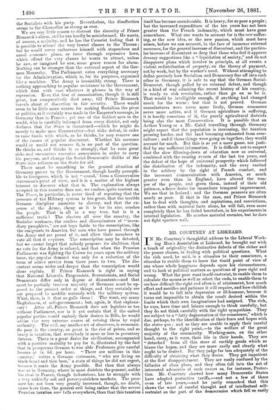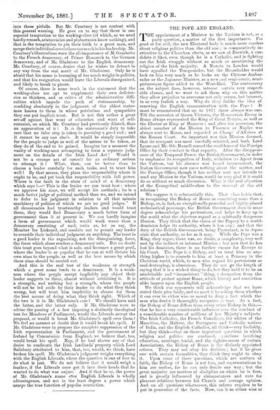MR. COURTNEY AT LISKEARD.
TN Mr. Courtney's thoughtful address to the Liberal Work-
ing Men's Association at Liskeard, he brought out with a touch of originality the distinctive defects of the richer and the poorer classes, in dealing with political questions. What the rich need, he said, is a stimulus to their conscience, a stimulus to enable them to leave the timid point of view of one whose whole happiness depends upon his circumstances, and to look at political matters as questions of pure right and wrong. What the poor want is self-restraint, to enable them to calculate the means as well as select the ends, to enable them to see how difficult the right end often is of attainment, how much effort and sacrifice and patience it will require, and how childish it would be to fall into depression or ill-humour, because it turns out impossible to obtain the result desired within the limits which their own imaginations had assigned. The rich, he says, have time and leisure enough to think carefully, but they do not think carefully with the right sympathies. They are subject to a " fatty degeneration of the conscience," which is due, perhaps, to the identification of their fears and hopes with the status quo ; and so they are unable to apply their careful thought to the right point,—to the welfare of the great majority of the community. Working-men, on the other hand, carry, as it were, their life in their hands. They are " detached " from all this store of earthly goods which so biases the hopes, and they see more easily and clearly what ought to be desired. But they judge far less adequately of the difficulty of obtaining what they desire. They get impatient at the first disappointment. They are easily confused by the fallacies of class pleas, and they often fall into the net of interested advocates of such causes as, for instance, Protec- tion. Mr. Courtney showed how many Democratic States have adopted protective tariffs,—and not a few of these even of late years,—and he justly remarked that this shows the want of careful thought and of intellectual self- restraint on the part of the democracies which fell so easily into these pitfalls. But Mr. Courtney is not content with this general warning. He goes on to say that there is one especial temptation to the working-class (of which, as we need hardly remark,aristocracies and plutocracies know nothing), and that is the temptation to pin their faith to a great man, and merge their individual convictions too much in his leadership. Mr. Courtney's illustrations were the all-importance of M.Gambetta to the French democracy, of Prince Bismarck to the German democracy, and of Mr. Gladstone to the English democracy. Mr. Courtney, of course, denies that he wishes to detract in any way from the real merit of Mr. Gladstone. Only be is afraid that his name is becoming of too much weight in politics, and that his resignation would leave the Liberals disorganised, and likely to break to pieces. Of course, there is some truth in the statement that the working-class are apt to supplement their own deficien- cies as thinkers, and as critics of the administrative diffi- culties which impede the path of statesmanship, by confiding absolutely in the judgment of the ablest states- man known to them in whose patriotism and sympathies they can put implicit trust. But is not this rather a great set-off against that want of education and want of self- restraint, on which Mr. Courtney had previously dilated, than an aggravation of it ? It is the statesman's duty to take care that no false step is taken in pursuing a good end ; and it cannot be any one else's. It would be simply impossible for the people to judge as well of the means to be taken, as they do of the end to be gained. Imagine for a moment the vanity of working-men attempting to form a separate judg- ment on the details of the Irish Land Act ! Would it not be a strange act of conceit for an ordinary artisan to attempt it ? What., then, can be better than to choose a leader carefully for such tasks, and to trust him well ? By that means, they place the responsibility where it ought to be, and yet back the responsibility with full power. Where is the fault in the state of mind of a democracy which says ?—" This is the leader we can trust best ; where we approve his aims, we will accept his methods ; he is a much better judge of political method than we, and we intend to defer to his judgment in relation to all that minute machinery of politics of which we are no good judges." If all democracies had trustworthy leaders, and would trust them, they would find Democracy a much better form of government than it at present is. We can hardly imagine a form of government which would work worse than a democracy consisting of such units as, let us say, the Member for Liskeard, and resolute not to permit any leader to override their individual judgment on anything. The trust in a good leader is the organising, not the disorganising, force, the force which alone renders a democracy safe. But no doubt this trust goes beyond what is safe, and becomes a great peril, where the leader is so popular that he can at will dictate his own aims to the people, as well as the best means by which these aims should be carried out.
And this is the real test of the weakness or strength which a great name lends to a democracy. It is a weak- ness where the people accept implicitly any object their leader suggests to them, almost without criticising it. It is a strength, and nothing but a strength, where the people will not be led aside by their leader to do what they think wrong, but will trust him implicitly to choose for them the best means of doing what they think right. Which of the two is it in Mr. Gladstone's ease ? We should have said the latter, and the latter only. If Mr. Gladstone were to advise the passing of a law imposing a distinctly theological test for Members of Parliament, would the Liberals accept the proposal, or would it break Mr. Gladstone's spell over them? We feel no manner of doubt that it would break his spell. If Mr. Gladstone were to propose the complete suppression of the Irish representation in Parliament, and the government of Ireland by Commission from England, we believe that, too, would break his spell. Nay, if he had shown any of that desire to confiscate the Irish landlords' property which Lord Salisbury attributed to him, that, too, would, we think, have broken his spell. Mr. Gladstone's judgment weighs everything with the English Liberals, where the question is one of how to do what is just. We do not believe that it would weigh a feather, if the Liberals once got it into their heads that he wanted to do what was unjust. And if that be so, the power of Mr. Gladstone's name over English Liberals is wholly advantageous, and not in the least degree a power which usurps the true function of popular conviction.



































 Previous page
Previous page